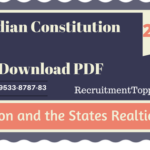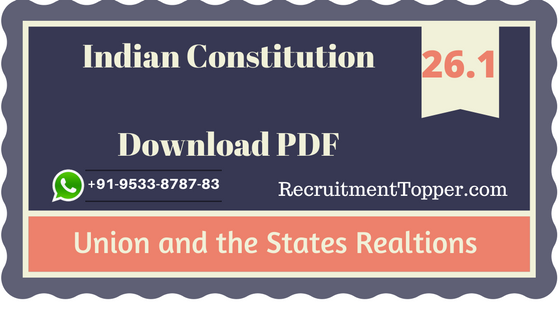Union and the States Relations | Indian Constitution Download PDF
Any federal scheme involves the setting up of dual governments and Need for co-ordination division of powers. But the success and strength of the nation between federal polity depends upon the maximum of co- the Units of the operation and co-ordination between the governments. The topic may be discussed under two heads:
(a) Relation between the Union and States;
(b) Relation between the States .
In the present Chapter the former aspect will be discussed and the interstate relations will be dealt with in the next Chapter.
(A) Techniques of Union Control Over States
It would be convenient to discuss this matter under two heads—(i) in emergencies; (ii) in normal times.
I. In Emergencies. It has already been pointed out that in ‘emergencies’ the government under the Indian Constitution will work as if it were a unitary government. This aspect will be more fully discussed in Chap. 28.
II. In Normal Times. Even in normal times, the Constitution has devised techniques of control over the States by the Union to ensure that the State governments do not interfere with the legislative and executive policies of the Union and also to ensure the efficiency and strength of each individual unit which is essential for the strength of the Union.
Some of these avenues of control arise out of the executive and legislative powers vested in the President, in relation to the States, e.g. :
(i) The power to appoint and dismiss the Governor [Arts. 155-156]; the power to appoint other dignitaries in the State, e.g., Judges of the High Court; Members of the State Public Service Commission [Arts. 217, 317].
(ii) Legislative powers, e.g., previous sanction to introduce legislation in the State Legislature [Art. 304, Proviso]; assent to specified legislation which must be reserved for his consideration [Art. 31A(1), Prov. 1; 31C, Prov. 288(2)]; instruction of President required for the Governor to make
Ordinance relating to specified matters [Art. 213(1), Prov.]; veto power in respect of other State Bills reserved by the Governor [Art. 200, Prov. 1],
These having been explained in the preceding Chapters, in the present chapter we shall discuss other specific agencies for Union control, namely:
(i) Directions to the State Government.
(ii) Delegation of Union functions.
(iii) All-India Services.
(iv) Grant-in-aid.
(v) Inter-State Councils.
(vi) Inter-State Commerce Commission [Art. 307].
Directions by the Union to State Government
The idea of the Union giving directions to the States is foreign and repugnant to a truly federal system. But this idea was Union to State taken by the framers of our Constitution from the Governments. Government of India Act, 1935, in view of the peculiar conditions of this country and, particularly, the circumstances out of which the federation emerged.
The circumstances under which and the matters relating to which it shall be competent for the Union to give directions to a State have already been stated. The sanction prescribed by the Constitution to secure compliance with such directions remains to be discussed.
“Where any State has failed to comply with, or to give effect to, any directions given in the exercise of the executive power of the Union under any of the provisions of this Constitution, it shall be lawful for the President to hold that a situation has arisen in which the Government of the State cannot be carried on in accordance with the provisions of this Constitution.”
And as soon as a Proclamation under Art. 356 is made by the President he will be entitled to assume to himself any of the functions of the State Government as are specified in that Article.
Delegation of Functions
It has already been stated that with the consent of the Government of a Delegation of State, President may entrust to that Government Functions. executive functions of the Union relating to any matter [Art. 258(1)]. While legislating on a Union subject, Parliament may delegate powers to the State Governments and their officers insofar as the statute is applicable in the respective States [Art. 258(2)].
Conversely, a State Government may, with the consent of the Government of India, confer administrative functions upon the latter, relating to State subjects [Art. 258A]
Thus, where it is inconvenient for either Government to directly carry out its administrative functions, it may have those functions executed through the other Government.
Grant-in-Aid.
As stated earlier, Parliament is given power to make such grants as it may deem necessary to give financial assistance to any State which is in need of such assistance [Art. 275]
By means of the grants, the Union would be in a position to correct inter-State disparities in financial resources which are not conducive to an all-round development of the country and also to exercise control and co¬ordination over die welfare schemes of the States on a national scale.
Besides this general power to make grants to the States for financial assistance, the Constitution provides for specific grants on two matters: (a) For schemes of development, for welfare of Scheduled Tribes and for raising the level of administration of Scheduled Areas, as may have been undertaken by a State with the approval of the Government of India, (b) To the State of Assam, for the development of the tribal Areas in that State [Provisos. 1-2,Art. 275(1)].
The President is empowered to establish an inter-State Council [Art. 263] if at any time it appears to him that the public interests . Though the President is given the power to define the nature of the duties to be performed by the Council, the Constitution outlines the three-fold duties that may be assigned to this body. One of these is—
“the duty of inquiring into and advising upon disputes which may have arisen between States.”
The other functions of such Council would be to investigate and discuss subjects of common interest between the Union and the States or between two or more States inter e.g. research in such matters as agriculture, forestry, public health and to make recommendation for co-ordination of policy and action relating to such subject.
In exercise of this power, the President has so far established a Central Council of Health,2 a Central Council of Local Self-Government,3 and a Transport Development Council,4 for the purpose of co-ordinating the policy of the States relating to these matters. In fact, the primary object of an Inter¬State Council being co-ordination and federal cohesion, this object has been lost sight of, while creating fragmentary bodies to deal with specified matters relying on the statutory interpretation that the singular ‘a’ before the word ‘Council’ includes the plural.
The Sarkaria Commission has recommended the constitution of a permanent inter-State Council, which should be charged with the duties set out in (b) and (c) of Art. 263. Such a Council, consisting of Prime Minister being Chairman of Council, Six Union Cabinet Ministers nominated by Prime Minister, the Chief Ministers of all the States, Chief Ministers of Union Territories having a Legislative Assembly and Administrators of Union Territories not having Legislative Assembly has been created vide Inter-State Council Order, 1990, notified through a Presidential Notification No. IV/11017/3/90 CSR dated 284)5-1990.’.
Further, with a view to ensure more harmonious and healthier relationship between the Centre and the States in future as well as for further strengthening of the third tier of governance, the Government had set up the second Commission on Centre State Relations on 27-04-2007 under the Chairmanship of Justice M.M. Punchhi, a retired Chief Justice of India. The second Commission on Centre -State Relations has submitted its Report on 31-03-2010 and has made 273 recommendations which are still under consideration by the Inter-State Council .Recently the Prime Minister approved re-constitution of InterState Council on 7-12-2012.

